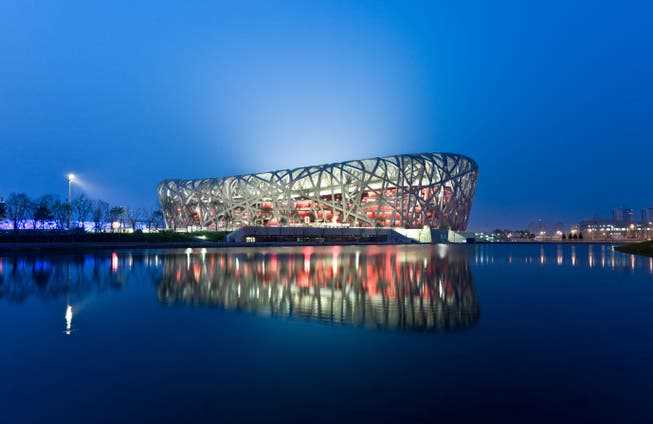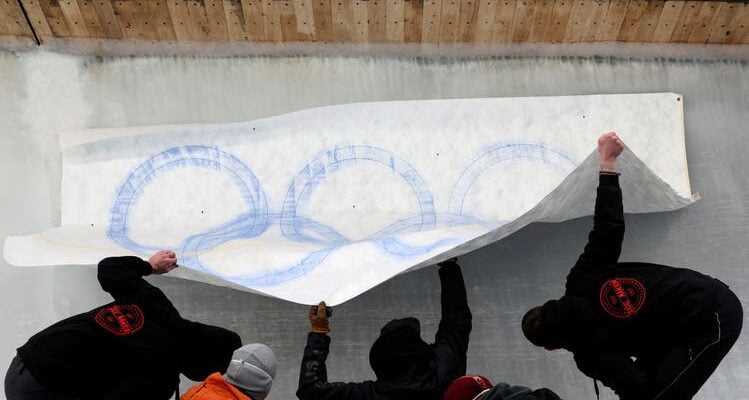The Winter Olympics will take place in Beijing between February 4th and 20th. The answers to the most important questions about the major event.
Final preparations at the Yanqing Olympic Ice Track.
The games will officially open on Friday, February 4th, at 1 p.m. Swiss time. However, the first competitions take place before that. The mixed curling tournament starts on February 2nd, on February 3rd at 5:10 am the Swiss women meet Canada in the ice hockey tournament. The time difference between Switzerland and Beijing is plus seven hours. The first highlight from a Swiss point of view will be the men’s downhill run on Sunday, February 6th at 4 a.m. The men’s skiathlon starts at 8 a.m. on the same day.
Swiss television broadcasts daily from 2 or 3 a.m. to 4:30 p.m. from Beijing, focusing on competitions by Swiss athletes.
The detailed Olympic program is available here.

The National Stadium in Beijing, China.
The opening and closing ceremonies will take place at the Olympic Stadium in Beijing. The “Bird’s Nest” was designed for the 2008 Summer Games by the Basel architects Jacques Herzog and Pierre de Meuron in collaboration with the Chinese artist Ai Weiwei. Ice sports and big-air freestyle competitions are also held in the capital.
Chongli, about 180 kilometers from Beijing, is a venue for Nordic skiing and biathlon; Alpine skiers and bobsledders are guests in the Yanqing ski area. There are Olympic villages at all three locations. These are the same high security zones because of the pandemic. Beijing is the first city in history to host both Winter and Summer Games.
To the report from Chongli
To the report from Yanqing
When the games were awarded in July 2015, only Beijing and Almaty in Kazakhstan were still in the running. Previously, possible candidacies from Graubünden, Oslo, Stockholm or Munich had failed due to the rejection of the respective voters.
The awarding of the games to Beijing was well received by the winter sports industry. Above all, she sees China as a growth market and dreams of 300 million active Chinese winter sports enthusiasts.
The climatic conditions for the Winter Games in Beijing are not ideal. Although it is very cold, there is no precipitation. In addition, the strong wind in the ski area could become a problem. The 24th Winter Olympics will be the first in history to be held without natural snow. An Austrian is responsible for the snow base on the slopes. In the Yanqing ski area alone, 158 snow cannons and 30 so-called lances were used. Didier Défago and Bernhard Russi, two Swiss, designed the downhill run.
To the podcast on the interests of the winter sports industry in connection with the Olympic Games
Swiss Olympic has selected 168 athletes for Beijing, 75 women and 93 men. Some athletes have already arrived in Beijing; For example, the unvaccinated snowboarder Patrizia Kummer, who went into quarantine for three weeks.
There are also unlucky Swiss athletes. Four years ago, ski crosser Marc Bischofberger won the silver medal in Pyeongchang. However, the 30-year-old from Appenzeller will not be able to defend this, he failed due to the selection hurdles in the strong Swiss team.
109 sets of medals will be awarded in Beijing, 7 more than in Pyeongchang in 2018. Mixed competitions are trending, 4 of the 7 new disciplines are team competitions for women and men.
The new disciplines in Beijing
- mixed aerials. For the first time there is a mixed competition for the acrobats on the hill – much to the delight of the Chinese hosts. They clearly dominated both World Cup events. Thanks to the very strong men (6 podium places in 6 competitions), the Swiss can also hope for a medal.
- Mixed snowboard cross. When it comes to boardercross, the Swiss are no longer among the absolute best. In addition to the men’s and women’s races, there is now a team competition.
- mixed ski jumping. Ski jumping is one of the few sports in which women have fewer medal chances than men. They only jump from the normal hill, the men also from the large hill and in a team competition. However, Switzerland does not provide a team.
- Mixed short track. Another new competition in which the Chinese have great chances of winning a medal. Switzerland is not represented in the short track.
- Ski freestyle, big air. The freestyle skiers get another chance for a medal with the Big Air – a jump from a giant hill.
- Monobob, women. In order to give both women and men two chances of winning a medal, the monobob was included in the programme. There are simply not enough athletes among the women to be able to start in the foursome.
Swiss Olympic has given out 15 medals as a goal – as many as four years ago in Pyeongchang and 1988 in Calgary. Switzerland has the best chances of winning precious metal in the following disciplines.
Swiss medal chances in Beijing
- Alpine skiing, women. Unlike in the World Cup, a combination is used at the Olympics. Michelle Gisin is the defending champion in this discipline, while teammate Wendy Holdener became world champion in 2017 and 2019. Holdener and Gisin also have the potential for a medal in the technical disciplines. There are also Lara Gut-Behrami (giant slalom, super-G, downhill) and Corinne Suter in the speed disciplines. The downhill world champion Suter has experienced a complicated season due to an injury in autumn, but won the Olympic dress rehearsal with the downhill in Garmisch.
- Alpine skiing, men. Beat Feuz is still missing a piece of the mosaic in Palmarès. The speed specialist has yet to win an Olympic gold. In the downhill he probably has the last chance to win the Olympics. The leader in the overall World Cup, Marco Odermatt, has medal potential in three disciplines. In the giant slalom, Odermatt won four times this winter and twice in the Super-G. He also recently proved his qualities as a downhill skier with the two second places in Wengen and Kitzbühel. The recently strong Swiss slalom team, on the other hand, is experiencing a difficult winter. Ramon Zenhauser, 2018 silver medalist, and Loïc Meillard failed to achieve a podium finish. After all, Daniel Yule finished second in Wengen. Like the women, the men also have chances in the combination, Luca Aerni is a specialist in this discipline.
- curling You can rely on the curlers at the Olympic Games. Since the discipline was reinstated in the Olympic program in 1998, Switzerland has only not won a medal in 2014. The women around Skip Silvana Tirinzoni became world champions in 2019 and 2021. The men with Peter De Cruz won bronze in Pyeongchang, the mixed team Jenny Perret / Martin Rios the silver medal.
- Ski freestyle. Sarah Hoefflin and Mathilde Gremaud won gold and silver in slopestyle in 2018. Hoefflin achieved 3 podium finishes this winter in slopestyle and big air, Gremaud was out due to injury but reported fit in time for Beijing. Andri Ragettli won the men’s comeback after a knee injury right away in the World Cup and at the X-Games in Aspen. In ski cross, the Swiss men had a luxury problem with the selection. 7 athletes with podium chances made 4 Olympic starting places among themselves. Ryan Regez and Alex Fiva have the best chances for a medal in Beijing. For women, Fanny Smith is one of the favorites.
- Alpine snowboarding. Patrizia Kummer (2014) and Nevin Galmarini (2018) have won the gold medal in the parallel giant slalom in the last two games. Kummer has had a mixed performance so far this winter and has had to isolate himself in Beijing for 21 days. Although Galmarini suffers from back problems, he has given up another medal as a goal.
- Ice Hockey. The Swiss want to win another medal after bronze in Sochi 2014. Last August, Colin Muller’s team reached the World Cup semi-finals for the first time since 2012, but missed out on a medal. The USA and Canada will probably decide between themselves gold and silver, Switzerland remains the fight for bronze – probably against the slightly better classified Finns. For the men, it should finally work with precious metal. National coach Patrick Fischer has set the goal of qualifying for the semi-finals. The Swiss won World Cup silver in 2018 and just missed the semi-finals in 2019 and 2021. In addition, the cancellation of the NHL should hit the big ice hockey nations harder than Switzerland.
Successful dress rehearsal: Andri Ragettli wins gold in slopestyle at the X-Games.
The athletes are hermetically sealed off from the Chinese public. Those who are fully vaccinated can forgo a 21-day entry quarantine. The athletes are tested daily at the games, and the organizers also write about “health monitoring” in the Olympic playbook.
Before departure, the athletes have to undergo two PCR tests, and a further test is carried out when entering China. In addition, the participants have to download an app and use it to record various health data such as body temperature 14 days before arriving in China.
During the Games, the athletes are only allowed to move in a bubble between the Olympic Village and the training and competition sites. In addition, the now well-known distance and hygiene rules apply. In addition, one should not cheer other athletes with singing or shouting, but with clapping.
Initially, tickets for the Olympic Games went on sale, but only in China, and foreign spectators are not allowed. In mid-January, however, the government stopped advance sales, and the tickets were only distributed through the authorities, referring to the “complicated pandemic situation” in China. State employees and school classes in particular will probably be able to watch. The audience must be tested repeatedly before the competitions.
The torch relay was greatly shortened in light of the pandemic. On October 18, the Olympic flame was lit near Athens and then, after a short leg in Greece, was flown to Beijing. From February 2nd to 4th, the torch will be carried through the three Olympic venues, but the run will take place without spectators and as far as possible away from official roads.
Dealing with the Uyghurs, with Tibet, the saber-rattling in the South China Sea or the disappearance of tennis player Peng Shuai – China is repeatedly criticized internationally. Various Western governments will therefore not send top politicians to the Olympic Games, including the USA, Great Britain and Switzerland. However, the Federal Council did not name the criticism of China, but the tense pandemic situation in Switzerland and the restrictive measures in China as reasons for the cancellation.
On the other hand, Russia’s head of state Vladimir Putin will visit the games and probably use them to get closer to China. The Chinese party leader Xi Jinping also met the President of the International Olympic Committee (IOC), Thomas Bach. Bach is the first foreign guest Xi has received since the outbreak of the pandemic.
